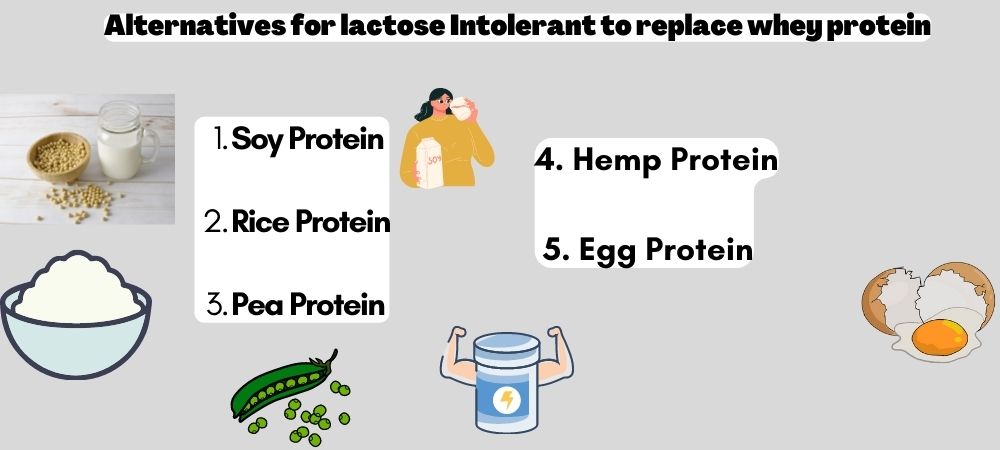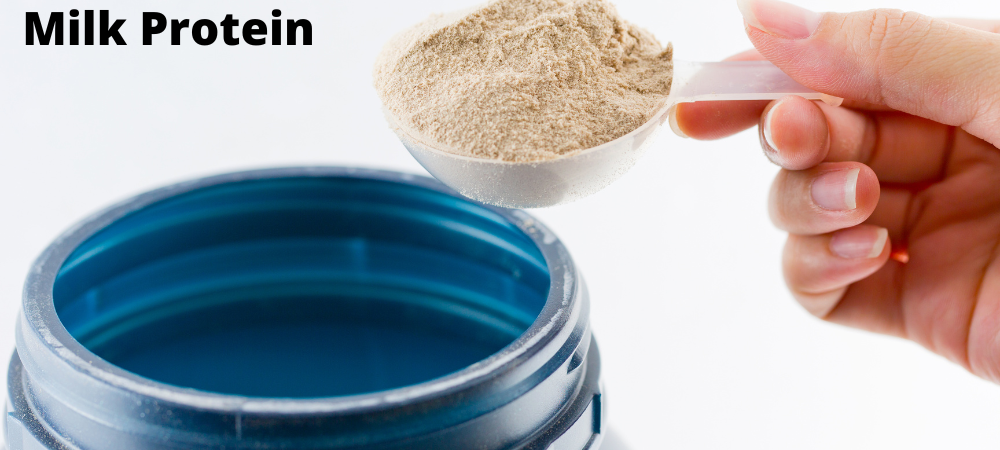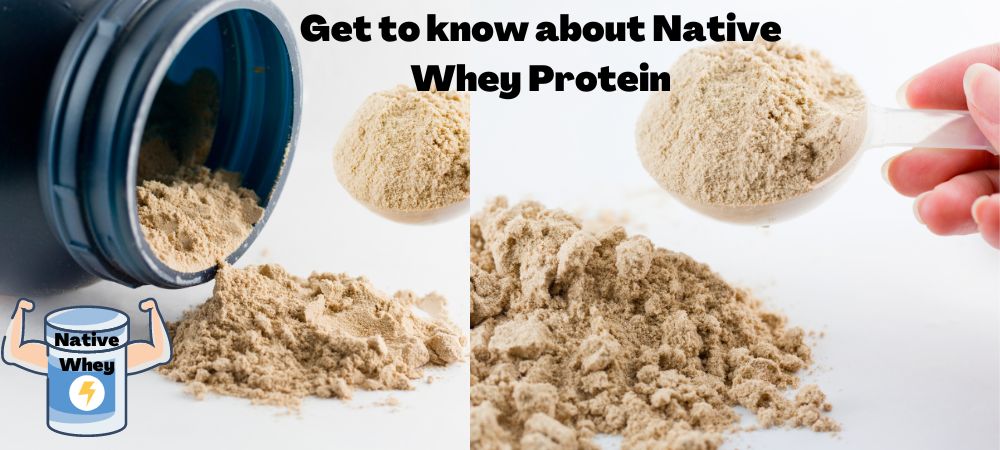Whey protein is a famous dairy-based supplement that people, especially athletes, widely used. However, individuals with lactose intolerance often avoid the consumption of dairy-based products, including whey. This is due to the presence of lactose, a type of sugar, in milk-derived products. Still, lactose intolerant can consume some proportion of whey protein depending on certain factors. To further understand, it is important to know about both whey protein and lactose intolerance.
This article will discuss the possibility of consuming whey protein if you are lactose intolerant. Moreover, you will get to know about some best alternatives to replace whey protein.
Why lactose intolerance occurs?
Lactose is a milk sugar commonly found in milk or dairy-derived food products.
People with lactose intolerance are unable to digest lactose in their bodies due to the absence of an enzyme known as lactase. Some people have a limited amount of lactase which may not be sufficient to digest lactose.
It is a fairly common problem throughout the world. According to a report, nearly 65 percent of the world’s population is affected due to lactose intolerance (1).
People with lactose intolerance have to face several digestive problems upon ingestion of milk-based products. These include digestive discomfort, bloating, diarrhea, nausea, and vomiting. The intensity of these problems largely varies among individuals.
Does whey protein contain lactose?
Whey protein is formed from whey which is a liquid derived from milk during the cheese making process. Since it is a milk-derived product, lactose is also found in whey protein powder. However, the lactose content can be further reduced depending on the manufacturing process of whey protein.
Generally, more refined forms of whey protein contain less lactose as compared to less refined protein. Overall, whey protein is available in 3 different forms, which include (2):
- Whey protein concentrate (35 to 80% protein)
- Whey protein isolate (90 to 96% protein)
- Whey protein hydrolysate (it is a pre-digested form).
Whey protein isolate is a more refined form of whey and contains significantly less fat and lactose as compared to whey protein concentrate. This is why people with lactose intolerance can take some quantity of whey protein isolate without any health effects (3).
Can people with lactose intolerance consume whey protein?
The severity of lactose intolerance can vary from person to person. Some people can tolerate little quantity of lactose, while others don’t have the ability to consume even small content. Therefore, if you can tolerate a small quantity of lactose, you might be able to enjoy the whey protein content. People who can tolerate some lactose can even enjoy some types of cheese.
According to scientific research, people with lactose intolerance can have the ability to tolerate up to 12 g of lactose per day (4). However, it is essential to know about the condition of lactose intolerance to know if you can consume some amount.
Still, whey protein isolate is recommended product (due to low lactose), and whey protein concentrate should be avoided.
Benefits of whey protein
Whey protein is known as “complete protein” as it contains all essential amino acids necessary for the human body’s normal functioning.
Particularly, scientific research has shown that whey protein can help in gaining strength and building and repairing muscles in adults (5). Hence, it has emerged as a popular protein supplement among fitness, health enthusiasts and bodybuilders for building muscles.
Some other benefits of whey protein include:
- Assist in weight loss
- Reduce your Appetite (2).
A refined form of whey protein, native whey, is also widely available in the markets. Native whey is extracted directly from unprocessed milk via the advanced filtration method.
Lactose intolerance is different from milk allergy
Since whey protein is obtained from milk, it might cause allergy in people who are susceptible to milk allergy. In this regard, it should be noted that milk allergy is totally different from lactose intolerance.
If you are allergic to milk, you should not consider eating whey protein. The common symptoms of milk allergy include:
- Facial Swelling
- Rashes
- Hives
- Runny or stuffy nose
- Throat swelling (6).
In severe cases, an allergic person may face serious conditions like anaphylaxis, which can put human life in danger. Although milk allergy is rare in adults, however, care must be taken as it can result in serious health issues. If you are allergic to milk protein, you can enjoy non-dairy protein powders.
Alternative to whey protein for lactose intolerance
Some people can’t even tolerate a small amount of lactose in their diet, so they must seek a non-dairy alternative to use as a protein source. Fortunately, wide varieties of quality proteins are available in the markets. These alternatives are completely lactose-free and can provide similar protein benefits.
Pea Protein
As the name indicates, this protein is a plant-based product extracted from yellow peas. Similar to whey protein, pea protein is also known to possess all essential amino acids. However, the content of methionine is found to be relatively lower in pea protein.
It is also an easily digestible plant-based protein and is known as a rich source of iron. In addition, it is naturally hypoallergenic and lactose-free. Therefore, it is a good choice for people with lactose intolerance.
Pea protein powder can assist in weight loss and muscle growth as well as improve heart health (7).
Rice Protein
Rice protein is another vegan, lactose-free protein source obtained from brown rice. It is a rich source of essential amino acids, iron, and some calcium.
The scientific evidence collected during the 8-week training program showed that rice protein has similar effects in supporting muscle growth and performance outcomes as whey protein powder (8).
Additionally, rice protein has the ability to support and enhance muscle recovery after an intense workout (9). Hence, if you have lactose intolerance or milk allergy, you can consider rice protein powder as an alternative option.
Soy Protein
Soy protein is a hypoallergenic, gluten-free, and lactose-free protein extracted from soybean. Soy protein contains all essential amino acids in a similar manner as animal protein. Additionally, this protein powder also offers vitamins and minerals for normal body functioning (10).
Soy protein can help in losing weight, building muscles, providing energy, and improving heart health. Moreover, soy protein reduces the risk of breast cancer and improves the human immune system (11).
Soy protein is considered an excellent choice to replace whey protein for people with lactose intolerance or milk allergy.
Hemp Protein
Pressed hemp seeds are crushed into a fine powder to produce hemp protein powder. It contains all nine of the essential amino acids that the human body needs, making it a complete protein.
In addition to amino acids, hemp protein powder also contains plenty of fiber, healthy fats, and beneficial minerals. Your body can easily digest hemp protein and make it available for repairing and maintaining body muscles (12). Hence, it has also emerged as an alternative non-dairy protein.
Egg Protein
If you are lactose intolerant, you can consider trying egg protein which is a complete protein similar to whey. Egg protein is already popular among bodybuilders aiming to enhance body strength and muscles.
Summary
Whey protein is a well-known product as a protein supplement. However, despite its various benefits, some people avoid the consumption of whey due to lactose intolerance. Still, there are chances that some people with lactose intolerance can tolerate a small amount of lactose; thus, consuming smaller quantities of whey won’t affect them.
However, other people can’t even tolerate any amount of lactose; thus, they must look for alternative protein sources. Such non-dairy protein sources include soy, pea, hemp, rice, and egg protein. These sources are helpful as lactose-free proteins to replace whey protein. They can also be utilized as an alternative if you have a milk allergy.
Although allergy to egg or plant-based protein is rare, it still exists among humans. Thus, one should be careful if he is allergic to any food nutrient. You should consult your nutritionist before consuming whey protein if you are lactose intolerant.




